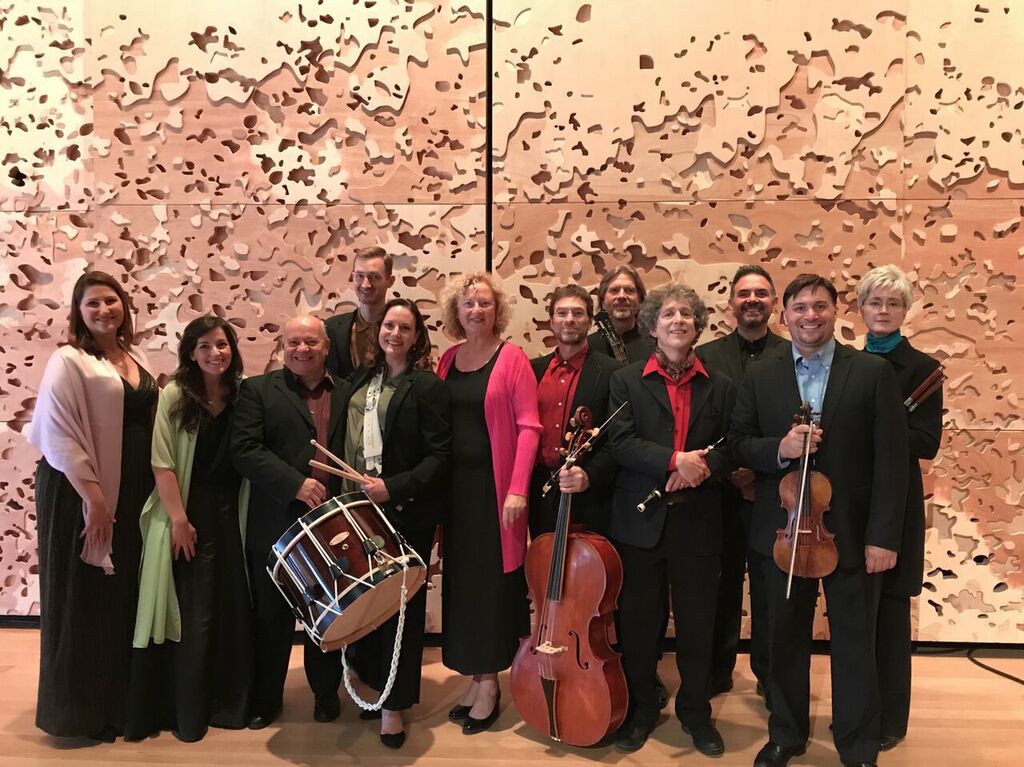Boston Camerata brings out the sincerity and swagger of New England hymnody

The Boston Camerata performed a program of American music Friday night at First Church in Cambridge.
The Boston Camerata under Anne Azéma’s direction explored over two centuries of early New England hymns on Friday night at First Church in Cambridge.
Sources for its “City On The Hill” program included the Bay Psalm Book of 1640, groundbreaking late 18th Century works by William Billings, early 19th Century hymns by Jeremiah Ingalls, and preservationist pieces published after the Civil War.
Much of this music was sung in its time by everyday parishioners. In many cases it was created by self-taught composers such as Ingalls using compositional ideas outside formal conservatory technique. Such idiosyncrasies speak to the folk flavor of this repertoire, and of people forging a distinctly American musical identity.
Mezzo Azéma launched right into the Prologue with the Shaker song “In Yonder Valley” in a passionate, reverberant solo. She then sang in close harmony alongside soprano Camila Parias and alto Deborah Rentz-Moore for Billings’ “Hatfield,” all demonstrating clarity of line, sensitive blend and clear diction. Inflections on lyrics like “Lord crush the serpent” were palpable but never overdone. Rentz-Moore joined tenors Daniel Hershey and Michael Barrett and bass-baritone Luke Scott on Billings’ bittersweet spiritual “Africa,” creating still another rich texture.
Most of the singing was a cappella, demonstrating both the earnestness of the music as well as Boston Camerata’s musicianship. Violinist Eric Martin, flutist/guitarist Jesse Lepkoff and cellist Reinmar Seidler contributed heartfelt obbligatos and accompaniments in several selections.
Much of this music might sound simple against more ornate sacred music from the classical canon. Yet these nine musicians brought the assurance and insight of a professional ensemble while maintaining the sincerity of amateur musicmaking.
The “Sin and Judgment” section of the program added darker discussions of faith. Barrett sang the melancholy, melodically descending Psalm 130 setting “Windsor” with subtle but evident conviction. The male trio’s transparent lines on William Tans’ur’s “Bangor” were musically impressive and their delivery of harsh declarations like “Man is but vanity!” were resolute. “Windham,” warning about failing to follow in God’s steps, featured the female trio crafting an interesting textural contrast as well as this section’s most haunting moment.
The “Tavern and Tabernacle” segment showed how popular songs from the British Isles influenced New England hymns. Martin fiddled the Cuba March that turned into Ingalls’ “The New Union.” Lepkoff combined the energy of a colonial fife with the fulsome tone of his wooden flute for “Dog and Gun,” which metamorphosed into “The Lord Will Provide.” The singers kept the slight swagger of the earlier instrumental incarnations while adding choral grandeur.
Hershey played the wicked inquisitor and Parias the innocent—and in this case bright-toned—“weaver’s bonny” in the humorous traditional ballad “The Devil’s Nine Questions.” Their dialogue opened up into a full ensemble rendition of Ingalls’ “Innocent Sounds” and its more overt Christian messaging. Rentz-Moore sang with a saloon singer’s ease and an opera diva’s polish on “The Miller of Dee.” Ingalls’ “The Heavenly Courtier” followed, describing a holy courtship with Jesus. Scott’s smooth bass-baritone, Lepkoff’s rolling guitar and Seidler’s plucked bass lines (with cello saddled on his knee like a bass guitar) made it come across like a colonial country song.
A selection of Shaker hymns was the evening’s barest and yet most powerful segment. “Trumpet of Peace” featured Barrett once again a cappella and singing with appropriately pacific tone. The unison female choir on “O We Have Found A Lovely Vine” was seamless and gleaming in its blend, well-suited to the text’s verdant imagery. The three men on “Rights of Conscience” were moving and tight despite the song’s unusual melodic curves.
Azéma described the music in the fifth and final section of the program, “At The River,” as slightly “rough-hewn” and not always following the typical soprano-alto-tenor-bass configuration. Regardless of the arrangement, the vocal sextet sang with a warmth that made these works sound completely natural. Their swaying interpretation of Billings’ “Jordan” demonstrated why the composer was so popular in his time. “Deal Gently With Thy Servants” (from the 1849 collection The American Vocalist) showed what a refuge this music and its message must have been for churchgoers.
Several sections concluded with attendees rising from the pews and joyously singing along. Sheet music was provided but Boston Camerata taught each tune to the crowd through song. Azéma demonstrated “Old Hundred” in its original French Huguenot setting. The ensemble led the audience in the (literally) toe-tapping 18th Century English instrumental, “Captain Kidd,” and then the hymn that evolved from the same tune, “How Precious Is The Name.” Along with the closing “Burst, Ye Emerald Gates,” this communal performance perfectly illustrated Boston Camerata’s strength as an ensemble and its audible affection for this uniquely American repertoire.
The Boston Camerata will perform “Songes et Mençonges: Dreams and Deceptions” 11 p.m. June 12 at NEC’s Jordan Hall. bostoncamerata.org; 617-262-2092
Posted in Performances